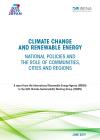

-
-
IRENA (2019), Climate Change and Renewable Energy: National policies and the role of communities, cities and regions (Report to the G20 Climate Sustainability Working Group (CSWG)), International Renewable Energy Agency, Abu Dhabi.
Copied
/-/media/Files/IRENA/Agency/Publication/2019/Jun/IRENA_G20_climate_sustainability_2019.pdf
Copied
Climate change and renewable energy
Newsletter
National policies and the role of communities, cities and regions
The transformation of the global energy system to reduce carbon dioxide (CO2) emissions requires engagement at all levels of society – from communities, regions and governments to numerous other stakeholders across the public and private sectors. This report examines ways for Group of Twenty (G20) countries to mobilise effective, meaningful action on energy decarbonisation.
Japan, holding the G20 presidency in 2019, asked the International Renewable Energy Agency (IRENA) for a report on the implications of the global energy transformation for climate and sustainability in a broad sense. Along with preserving the environment, improving urban air quality, and protecting the world’s climate, the massive uptake or renewables and energy efficiency promises to bring financial and economic opportunities, wider prosperity and new jobs.
IRENA has engaged with successive G20 presidencies since 2015 on a toolkit for renewable energy deployment. Increasingly, the organisation has aligned its G20 toolkit with the Paris Agreement and explored investment implications.
The special report from the Intergovernmental Panel on Climate Change (IPCC) in late 2018 underlined the growing impact of global warming, calling for urgent action. With two-thirds of greenhouse gas emissions originating from the energy sector, the IPCC has called for scaling up renewables and increasing energy efficiency immediately. Several global forums have developed action plans, both through the Sustainable Development Goals (SDGs) endorsed by the United Nations and through Nationally Determined Contributions (NDCs) under the Paris Agreement. Yet climate policies need to become more ambitious.
Renewables and energy efficiency offer a safe, reliable and affordable way to achieve massive decarbonisation, in line with keeping the rise in global temperatures “well below 2°C”. The combination of renewables, energy efficiency and increased electrification could achieve 90% of the reductions needed in energy-related emissions, IRENA’s analysis shows.




